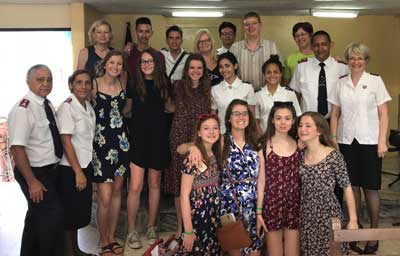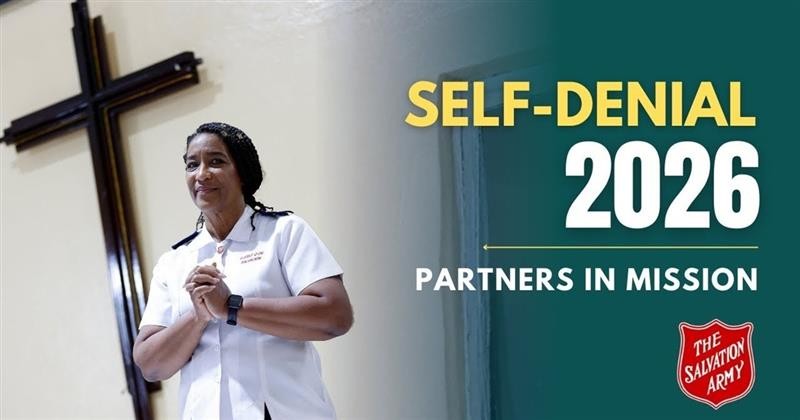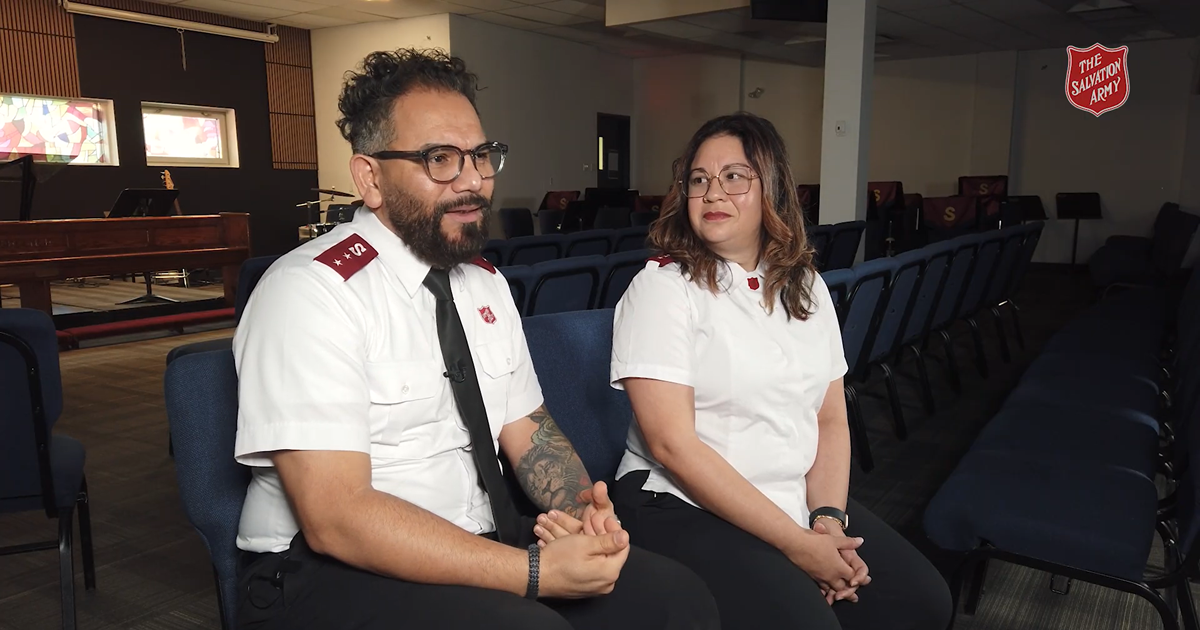(Above) The team leads a day of games, sports and crafts at Havana Corps for Salvation Army youth and other children in the community
In March, a team from Kingston Citadel in Ontario stepped off a plane into the heat of Havana, Cuba—goodbye winter, hello sandals! We were met by Colonel Julio Moreno, a joyful, bulldog of an officer—both a retired professor and a former amateur boxer—who treated us like long-lost family. We piled onto an antique school bus covered in revolutionary graffiti and set out for our quarters.
We were sent off with the same love that greeted and kept us during our stay, forever thankful for our experiences and the friends we made. We left knowing our work is not done—we were called to Cuba and will return.
For now, we will return to Kingston Citadel to pray and plan, and introduce our brothers and sisters to our future in Cuba. The Salvation Army in Cuba has a great motto: Cuba Para Cristo, Cuba for Christ.
Sam MacLeod is the administrative co-ordinator for Kingston Citadel in Ontario.
In March, a team from Kingston Citadel in Ontario stepped off a plane into the heat of Havana, Cuba—goodbye winter, hello sandals! We were met by Colonel Julio Moreno, a joyful, bulldog of an officer—both a retired professor and a former amateur boxer—who treated us like long-lost family. We piled onto an antique school bus covered in revolutionary graffiti and set out for our quarters.
Our group, led by Major April McNeilly and our youth pastor, Amanda Doyle, was made up of four adults, two university students and six high school students. The purpose of our trip was to connect with The Salvation Army and learn about Cuba, and how we might be able to help.
We spent the next several days visiting various Ejército de Salvación operations, including corps buildings, youth ministries and an Army nursing home. As we toured the seniors’ home—a maze of staircases and turquoise hallways—many of the residents shook our hands and offered friendly holas. The director of the facility, an Army officer, explained the centre’s mission: to take care of those who need care and offer the light and love of the Lord.
On the upper floor, an unfinished great room that could double the facility’s capacity remains unfinished. The space had been a labour of love for past Salvationists, who laid tiles and erected walls, but resources are nearly non-existent. Elsewhere, the steel roof over the dining hall has rotted away due to a neighbouring vinegar factory. We think of the resources we have access to in Kingston—builders, architects and labourers that worship at the citadel and nearby corps. We feel charged to explore whether we can help. We will bring this project back with us.
Throughout the trip, we caught glimpses into the difficulties experienced by average Cubans—from conversations with friends along the way; from a visit to a children’s playground, consisting of a broken swing, glass and garbage; from views of dilapidated apartments along the highways. We were there to learn—about the needs, and about ourselves and the luxuries we take for granted. To learn that there is work to be done outside our walls.
While there is great need in Cuba, there is also abundance of spirit. The beauty and hospitality we experienced rivals the best any nation can provide. This is a country full of love—love for each other, love for Cuba and love for Jesus Christ. We saw this while attending an Army worship service in downtown Havana. On a side street, up a broken marble staircase, over a residential courtyard, and into a classroom, our group gathered with Colonel Moreno and his wife, the corps officer and a congregation of 50 or so.
 Mi corazón entona la canción, ¡cuán grande es él! ¡cuán grande es él! We sang and prayed together, just as we would 1,000 kilometres northward. Major McNeilly, with a translator beside her, offered a message regarding the importance of balancing social work with spiritual work (see James 1:27). The presence of the Holy Spirit was powerful, as both Canadians and Cubans knelt at the altar, rededicating their lives to the great work to be done. We prayed and then we ate—a collection of home-cooked delicacies, prepared by the women who can be found at every Salvation Army church across the world.
Mi corazón entona la canción, ¡cuán grande es él! ¡cuán grande es él! We sang and prayed together, just as we would 1,000 kilometres northward. Major McNeilly, with a translator beside her, offered a message regarding the importance of balancing social work with spiritual work (see James 1:27). The presence of the Holy Spirit was powerful, as both Canadians and Cubans knelt at the altar, rededicating their lives to the great work to be done. We prayed and then we ate—a collection of home-cooked delicacies, prepared by the women who can be found at every Salvation Army church across the world.
We spent the next several days visiting various Ejército de Salvación operations, including corps buildings, youth ministries and an Army nursing home. As we toured the seniors’ home—a maze of staircases and turquoise hallways—many of the residents shook our hands and offered friendly holas. The director of the facility, an Army officer, explained the centre’s mission: to take care of those who need care and offer the light and love of the Lord.
On the upper floor, an unfinished great room that could double the facility’s capacity remains unfinished. The space had been a labour of love for past Salvationists, who laid tiles and erected walls, but resources are nearly non-existent. Elsewhere, the steel roof over the dining hall has rotted away due to a neighbouring vinegar factory. We think of the resources we have access to in Kingston—builders, architects and labourers that worship at the citadel and nearby corps. We feel charged to explore whether we can help. We will bring this project back with us.
Throughout the trip, we caught glimpses into the difficulties experienced by average Cubans—from conversations with friends along the way; from a visit to a children’s playground, consisting of a broken swing, glass and garbage; from views of dilapidated apartments along the highways. We were there to learn—about the needs, and about ourselves and the luxuries we take for granted. To learn that there is work to be done outside our walls.
While there is great need in Cuba, there is also abundance of spirit. The beauty and hospitality we experienced rivals the best any nation can provide. This is a country full of love—love for each other, love for Cuba and love for Jesus Christ. We saw this while attending an Army worship service in downtown Havana. On a side street, up a broken marble staircase, over a residential courtyard, and into a classroom, our group gathered with Colonel Moreno and his wife, the corps officer and a congregation of 50 or so.
 Mi corazón entona la canción, ¡cuán grande es él! ¡cuán grande es él! We sang and prayed together, just as we would 1,000 kilometres northward. Major McNeilly, with a translator beside her, offered a message regarding the importance of balancing social work with spiritual work (see James 1:27). The presence of the Holy Spirit was powerful, as both Canadians and Cubans knelt at the altar, rededicating their lives to the great work to be done. We prayed and then we ate—a collection of home-cooked delicacies, prepared by the women who can be found at every Salvation Army church across the world.
Mi corazón entona la canción, ¡cuán grande es él! ¡cuán grande es él! We sang and prayed together, just as we would 1,000 kilometres northward. Major McNeilly, with a translator beside her, offered a message regarding the importance of balancing social work with spiritual work (see James 1:27). The presence of the Holy Spirit was powerful, as both Canadians and Cubans knelt at the altar, rededicating their lives to the great work to be done. We prayed and then we ate—a collection of home-cooked delicacies, prepared by the women who can be found at every Salvation Army church across the world.
We were sent off with the same love that greeted and kept us during our stay, forever thankful for our experiences and the friends we made. We left knowing our work is not done—we were called to Cuba and will return.
For now, we will return to Kingston Citadel to pray and plan, and introduce our brothers and sisters to our future in Cuba. The Salvation Army in Cuba has a great motto: Cuba Para Cristo, Cuba for Christ.
Sam MacLeod is the administrative co-ordinator for Kingston Citadel in Ontario.










Comment
On Friday, March 6, 2020, Rev. Peter MacDonald said:
Leave a Comment